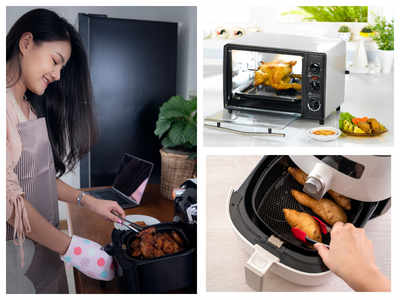When it comes to cooking, using the microwave is one of the most popular methods out there. However, it seems that as more and more people are switching over to using an air fryer for their hot meals, a lot of them are wondering whether or not this type of cooking uses more electricity than the microwave.
Some people may wonder whether or not using an air fryer to cook food will result in increased electricity usage. However, the truth is that it actually might not cost you any more money than using a microwave to cook food. This is because the air fryer uses convection technology to cook food, which means that it’s more energy-efficient than a microwave.
Another reason why the air fryer might be more energy efficient is because of the fact that it cooks food at much lower temperatures than a microwave. As long as you’re using an air fryer that has convection technology built into it, you shouldn’t be worried about increased electricity usage when you start using this method of cooking food.
Air fryers work by heating a limited space’s air to a temperature high enough to cook food. When the quantity of space and, as a result, the amount of air capacity is large, the amount of energy required to heat the area is also large.
Achieving low consumption levels with an Air Fryer oven requires lowering the heat. But that also impacts cooking times. If you want to extend the cooking time, you’ll have to turn up the heat and the power consumption will rise.
How much electricity does Air Fryer oven use?
An Air fryer is a kitchen appliance that cooks by air circulation and convection. It’s a popular solution for people who want to reduce their consumption of oil but still enjoy fried food. But what exactly is an Air Fryer’s power consumption?
A standard Air Fryer has a maximum output power of 1,500 watts. Most energy-efficient devices have a working temperature of between 180 and 240 degrees Fahrenheit. If you turn up the temperature on your Air Fryer, it will consume more electricity. Air fryers utilize between 1,400 and 1,700 watts of electricity on average, which translates to 1.4 to 1.7 kWh per hour of operation.
When it comes to your Air Fryer’s power consumption, the most important factors are its temperature and running time. Generally, you can expect an increase in power consumption when using a temperature of 400 °F or higher.
Which is better Air Fryer or Microwave?
Almost any appliance you might plug into an outlet can be used to cook food, but when it comes to the air fryer vs. microwave, which is better? Let’s compare some things that they are both able to do.
Microwaves can make food directly by zapping molecules with heat and moisture; these microwaves reach every nook and cranny of the food for a fast and efficient cooking process. The downside is that they require a vent.
Air fryers are similar to microwaves in their capabilities. They can work by generating heat and moisture, and they can reach every corner of the food. They also require a vent, but these are usually less restrictive than those found on microwaves.
The main difference is that air fryers use no oil; they cook food using electricity, which results in much less fat than traditional cooking methods. However, this means that you need to add artificial fat when cooking with an air fryer, usually via butter or vegetable oil.
Even though both air fryers and microwaves cook food quickly with little added fat, there are still some differences:
No Vent Required
Air fryers don’t require a vent, compared to microwaves that need vented space for the steam from cooking. The reason is that in an air fryer, a fan circulates hot air through the basket with the food. It doesn’t blow cold air into it from above like a microwave does, so there’s no need for a hood or venting.
Air Fryers Use Less Fat
Air fryers use less fat than microwaves; they don’t need to cook the food in oil though. However, you still have to add butter or vegetable oil.
Air Fryer Basket is Deep
Air fryers typically have deep baskets that can hold more food at one time than a microwave’s bowl or pan. That means you can cook more food at once and brown hot spots that would otherwise burn without burning the rest of the food.
Air Fryer Can Be Used for Cold
You can use an air fryer to cook ice cream, frozen vegetables and other cold foods that you would normally cook in the microwave.
Air Fryers are High Temperature
Most air fryers have plastic-coated wire baskets, which is a significant step up from most microwaves’ metal griddle plates. This means that they can retain heat for a longer time than cheaper microwaves.
Air Fryers are Hot
Air fryers have settings that can reach temperatures above 500 degrees, which is much higher than most microwaves. They cook food evenly and thoroughly in no time at all.
Air Fryers Are Safer
Air fryers are very safe appliances to use. Unlike on a stove, you don’t need to worry about burning yourself with hot steam or other hot ingredients, like oil or liquids.
Air Fryers are Cleaner
In an air fryer, all of the cooking is done in a confined, relatively small space. This means that less splatter and mess are created. This isn’t the case with a microwave where grease splatters everywhere when you cook meat or other messy food.
Happier Taste Buds
The foods that you cook with an air fryer will taste juicier and more flavorful than the same food that you cook in a microwave. That’s because the air fryer’s hot air circulation creates a uniform cooking process through convection heating.
There are many other pros and cons to each appliance, but these are some of the most significant when it comes to comparing an air fryer vs. a microwave.
Both air fryers and microwaves have a lot of versatility, which leads to the conclusion that having both devices in your home is a good idea. Most homes already have microwaves, and air fryers aren’t all that expensive, so getting one won’t break the bank.
Is it possible to use air fryers instead of microwaves, or vice versa?
Not at all. As previously stated, air fryers can prepare foods that microwaves cannot, while microwaves can perform activities that air fryers cannot. Not to mention the speed, capacity, and flavor differences. Both cooking equipments excel in distinct areas and do an excellent job of leveraging each other’s capabilities, demonstrating that having both in the kitchen is beneficial.
- Cosori Airfryer Vs Instant Pot - November 11, 2023
- Is White Cheddar Popcorn Healthy? - October 15, 2023
- Is Cheese Popcorn Unhealthy? - July 9, 2023

